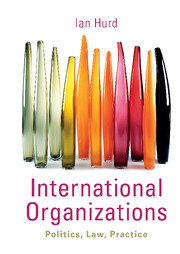Book contents
- Frontmatter
- Contents
- Preface
- Acknowledgement
- 1 Introduction to international organizations
- 2 A guide to the study of international organizations
- 3 The World Trade Organization
- 4 The International Monetary Fund and the World Bank
- 5 The United Nations I
- 6 The United Nations II
- 7 The International Labor Organization
- 8 The International Court of Justice
- 9 The International Criminal Court
- 10 Regional Organizations
- 11 Conclusion
- Index
- References
8 - The International Court of Justice
- Frontmatter
- Contents
- Preface
- Acknowledgement
- 1 Introduction to international organizations
- 2 A guide to the study of international organizations
- 3 The World Trade Organization
- 4 The International Monetary Fund and the World Bank
- 5 The United Nations I
- 6 The United Nations II
- 7 The International Labor Organization
- 8 The International Court of Justice
- 9 The International Criminal Court
- 10 Regional Organizations
- 11 Conclusion
- Index
- References
Summary
Key facts
Headquarters: The Hague
Members: 192 states
Mandate: to settle inter-state legal disputes with the consent of both parties.
Key structure: fifteen international judges provide definitive legal judgments when requested by states.
Key obligations: states agree to follow the decisions of the Court in cases to which they are a party, and to carry out provisional measures as requested by the Court.
Enforcement: a party that is unsatisfied with the performance of the losing party in a case may refer the matter to the UN Security Council.
Key clauses in the ICJ Statute:
Articles 2, 3, and 4 on the composition of the Court.
Article 34 on states as parties.
Article 36 on jurisdiction.
Article 38 on the sources of law.
Article 41 on provisional measures.
Article 59 on the absence of precedent.
UN Charter Article 94 on the obligation to comply with the ICJ.
UN Charter Article 96 on advisory opinions.
When countries find themselves in a dispute with another over their international legal obligations, the International Court of Justice can provide a decisive and binding judgment. The Court is an international legal body that hears cases involving legal complaints between consenting states. Its jurisdiction is carefully defined in order to preserve the sovereignty of the states involved, and much controversy comes out of the complicated relationship between state sovereignty and the binding nature of international law. For instance, it expressly forbids its decisions from serving as precedents for future cases. The Court provides two important functions in world politics: first, its decisions constitute formal and explicit legal judgments regarding who is right and wrong in a given dispute; and second, these decisions enter into the political discourse of states, despite the absence of precedent, and may have substantial influence beyond their legal terms.
- Type
- Chapter
- Information
- International OrganizationsPolitics, Law, Practice, pp. 186 - 216Publisher: Cambridge University PressPrint publication year: 2010



